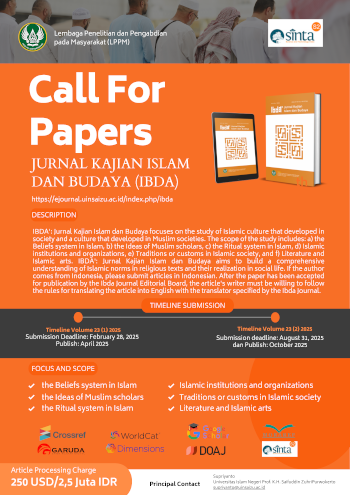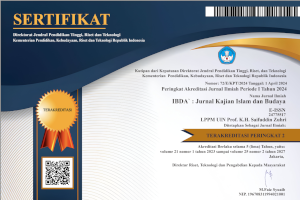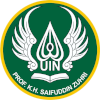Jum’at Berkah and the Tradition of Islamic Philanthropy: Anthropolinguistic Study of Sego Jum’at at the Jogokariyan Mosque, Yogyakarta
DOI:
https://doi.org/10.24090/ibda.v22i2.12220Keywords:
Jum’at Berkah, Alms, Anthropolinguistics, Philanthropy, Sego Jum’atAbstract
Religious language has become part of social life. Apart from functioning as an expression of religious devotion, religious language also contains the meaning of internalizing religious virtue, which has implications for social piety. This research aims to describe the Jum’at Berkah tradition at the Jogokariyan Mosque in Yogyakarta. This socioreligious tradition has strong roots in the doctrine of philanthropy and takes advantage of the momentum of Friday as a day that is believed to contain many blessings. Methodologically, this research utilizes qualitative research procedures and data collection through observation and interviews. By utilizing an anthropolinguistic perspective, this research finds several conclusions. First, the Jum’at Berkah tradition carried out at the Jogokariyan Mosque in Yogyakarta, is a cultural phenomenon of Muslim society closely related to the muscular and implicative elements of the Islamic language. Environmental, social, and religious understanding factors contribute to implementing Jum’at Berkah through Sego Jum’at. The use of the term Jum’at Berkah in giving charities is based on people's religious understanding. It explains that Friday is sayyidul ayyam, a good day, and distinguishes it from other days. Second, Jum’at Berkah has a religious impact with a socio-economic dimension, specifically increasing people's awareness of sharing, strengthening brotherhood ties with fellow humans, and competing to do kindness.Downloads
References
Al-Albani, M. N. (1998). Sahih Abi Daud Hadis ke-3764. Maktabah Al-Ma’arif Linnasr wa at-Tauzi’.
Al-Maliki, S. M. bin A. A. A.-H. (n.d.). Mafahim Yajibu an Tushahhah. Haiatus Shafwah Al-Malikiyyah,.
Asy-Syuyuti, J. (1986). Al-Lum’ah fi Khasais Yaum al-Jum’ah. Dar Ibn Qoyyim.
Bahari, D. F., & AK, M. F. (2021). Perspektif Pedagang terhadap Efek Sedekah Melalui Berkah dalam Memudahkan Perolehan Rezeki Jurnal Akuntansi, Ekonomi Dan Manajemen Bisnis, 1(2), 86–91.
Cucu, C., & Rahmi, H. N. (2021). Mosque as a Place To Build Moderate Community. Hikmatuna: Journal for Integrative Islamic Studies, 7(2), 147–155.
Daga, R., & Salam, K. N. (2022). Pandemi COVID-19 Memberdayakan Ibu-Ibu yang kehilangan Pekerjaan untuk Mengelolah Sedekah Jum’at ke Mesjid dan Panti asuhan di Kota Makassar. Panrannuangku Jurnal Pengabdian Masyarakat, 2(1), 7–13.
Fauzia, A. (2016). Filantropi islam, sejarah dan kontestasi masyarakat sipil dan Negara di Indonesia.
Gea, T. B. (2021). Orientasi Nilai Budaya Masyarakat Nias dalam Maena pada Upacara Falöwa. Diglosia: Jurnal Kajian Bahasa, Sastra, Dan Pengajarannya, 4(4), 487–498.
Holilulloh, A. (2020). Kontribusi Pemikiran Nahwu Imam Sibawaih dan Ibrahim Mushtafa dalam Linguistik Arab: Studi Komparatif Epistemologis. Alfaz (Arabic Literatures for Academic Zealots), 8(1), 35–56.
Kajian Antropolinguistik dalam Prosesi Temu Pengantin Masyarakat Kabupaten Pasuruan_Tesis UNISMA.pdf. (n.d.).
Kasdi, A. (2016). Filantropi Islam untuk pemberdayaan ekonomi umat (Model pemberdayaan ZISWAF di BMT Se-Kabupaten Demak). Iqtishadia: Jurnal Kajian Ekonomi Dan Bisnis Islam STAIN Kudus, 9(2), 227–245.
Kesturi, G., & Helmy, M. I. (n.d.). The Understanding of Hadith Sadaqah and Its Implementation on Social Empowerment: A Research on Jum’ah Berkah Tradition in Wonogiri Society. Jurnal Studi Ilmu-Ilmu Al-Qur’an Dan Hadis, 23(1), 69–88.
Kumari, R., Nurhayati, S., Harmiasih, S., & Yunitasari, S. E. (2023). Menumbuhkan Sikap Empati Pada Anak Usia Dini Melalui Pembiasaan Sedekah Jumat Berkah di PAUD Insan Mandiri Kota Bogor. Aksara: Jurnal Ilmu Pendidikan Nonformal, 9(2), 1067–1074.
Lafamane, F. (2018). Hubungan Budaya dan Pengajaran Bahasa. 24. https://www.researchgate.net/publication/328052056_HUBUNGAN_BUDAYA_DAN_PENGAJARAN_BAHASA
Latief, H. (2013). Politik filantropi Islam di Indonesia: negara, pasar, dan masyarakat sipil. Penerbit Ombak.
M. Abdul Mujieb dkk. (2009). Ensiklopedi Tasawuf Imam Al-Ghazali. Hikmah.
Munthe, F. T. W. (2022). The Philanthropy of Coastal Society: The Challenge and Strategy of Komunitas Jumat Berkah Muara Pantuan. LENTERA, 1–20.
Norianda, N., Dewantara, J. A., & Sulistyarini, S. (2021). Internalisasi Nilai dan Karakter Melalui Budaya Sekolah (Studi Budaya Sekolah Jumat Berkah). WASKITA: Jurnal Pendidikan Nilai Dan Pembangunan Karakter, 5(1), 45–57.
Penyusun, T. (2008). Kamus Besar Bahasa Indonesia. Balai Pustaka.
Rusmayanti, F. A. (2022). Strategi Komunikasi Radio Songgolangit FM dalam Menarik Minat Pendengar Studi Kasus Program Jumat Berkah. Journal of Communication Studies, 2(1), 17–26.
Shaukat, K., Luo, S., Abbas, N., Mahboob Alam, T., Ehtesham Tahir, M., & Hameed, I. A. (2021). An analysis of the blessed Friday sale at a retail store using classification models. Proceedings of the 2021 4th International Conference on Software Engineering and Information Management, 193–198.
Shihab, M. Q. (2021). Tafsir Al-Misbah Pesan, Kesan, dan Keserasian Al-Qur’an Vol. 14. Penerbit Lentera Hati.
Sibarani, R. (2015). Pendekatan Antropolinguistik Terhadap Kajian Tradisi Lisan. In RETORIKA: Jurnal Ilmu Bahasa (Vol. 1, Issue 1, p. 1). https://doi.org/10.22225/jr.v1i1.9
Sugiyono. (2017). Metodologi penelitian kuantitatif kualitatif dan R&D. Alfabeta.
Syamsu, R. F., Arfah, A. I., Nasrudin, A. M., Royani, I., Rijal, S., Kusumardhani, S. I., Bima, I. H., Murfat, Z., Surdam, Z., & Makmun, A. (2021). Kegiatan Pengabdian Jum’at Berkah Swab Massal, Penyuluhan Kesehatan, dan Pembagian Al-Qur’an. Jurnal Pengabdian Kedokteran Indonesia, 2(2), 73–78.
Warson, A. (1984). Kamus Al-Munawwir. Pustaka Progresif.
Zaini, H. (2010). Perubahan Makna Leksikal dalam Pemakaian Bahasa Arab (Studi Kasus Pondok Modern Gontor). Adabiyyāt: Jurnal Bahasa Dan Sastra, 9(1), 133–154.
Downloads
Published
How to Cite
Issue
Section
License
Copyright (c) 2024 Mahmudah, Ibi Satibi, Hisyam Zaini, Andi Holilulloh

This work is licensed under a Creative Commons Attribution-ShareAlike 4.0 International License.
Authors who publish with this journal agree to the following terms:
- Authors retain copyright and grant the journal right of first publication with the work simultaneously licensed under a Creative Commons Attribution-ShareAlike License a that allows others to share the work with an acknowledgement of the work's authorship and initial publication in this journal.
- Authors are able to enter into separate, additional contractual arrangements for the non-exclusive distribution of the journal's published version of the work (e.g., post it to an institutional repository or publish it in a book), with an acknowledgment of its initial publication in this journal.
- Authors are permitted and encouraged to post their work online (e.g., in institutional repositories or on their website) before and during the submission process, as it can lead to productive exchanges, as well as earlier and greater citation of published work (See The Effect of Open Access).
















